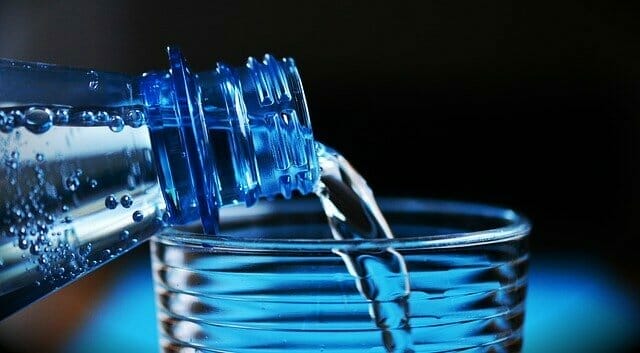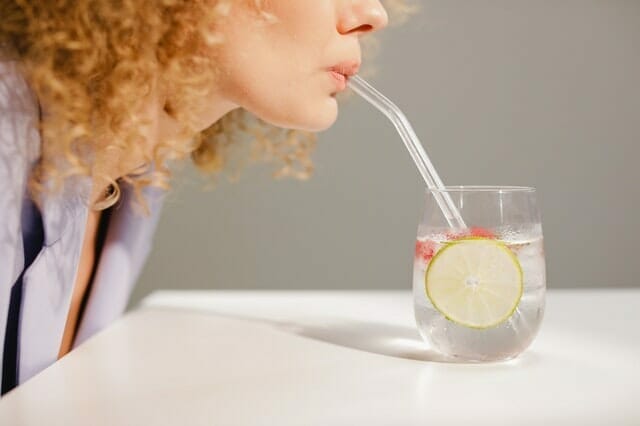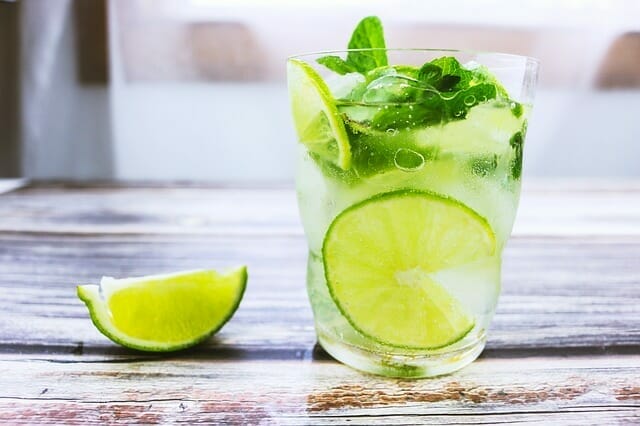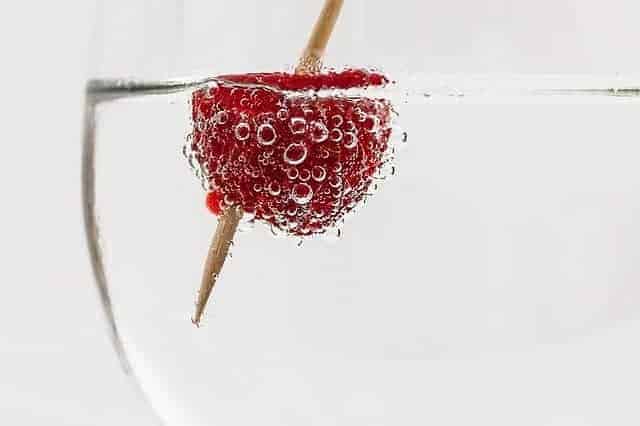Electrolytes are a group of minerals which perform important tasks in our body. They are responsible for conduction of nerve impulses and ensure proper functioning of organs and tissues. Electrolytes are also a key link in the process of body hydration. The body loses electrolytes very easily, especially in the case of intense physical activity, increased urination, and diarrhea. Taking care of the right concentration of electrolytes in the body is extremely important. Their deficiency may cause water-electrolyte balance disorders. As a consequence of electrolyte deficiency, deterioration of organ functions may also occur (one of the frequent effects of electrolyte deficiency is heart rhythm disturbance). Especially persons who train should take care of systematic electrolyte replenishment. Find out more about the role of electrolytes, effects of their deficiency and methods of replenishment.
Table of contents
What are electrolytes?

Electrolytes are salt ions that are part of our body fluids. They are present in plasma, blood and tissue fluids. Ions are negatively or positively charged atoms of a given element.
The most important electrolytes include salt ions of such elements as:
- potassium,
- magnesium,
- calcium,
- sodium,
- chlorine.
Iron and phosphorus ions also play the role of electrolytes.
Correct electrolyte concentration in the body is a condition of efficient water-electrolyte metabolism. One can even say that the work of the whole organism depends on the presence of electrolytes. Due to their electric charge, electrolytes attract water molecules, which are then transported to cells and tissues throughout the body.
Deficiency of electrolytes results in dehydration and dysfunction of key organs such as the brain and heart, as well as muscle abnormalities (e.g. cramps).
There is no doubt that electrolytes are necessary for the proper functioning of the body. They have many important functions and are involved in numerous processes and transformations. Their key role is conduction of nerve impulses, thanks to which the brain can function properly.
Functions of electrolytes in the body
- Conducting electrical impulses between neurons, electrolytes are responsible for proper functioning of the nervous system,
- take part in transmitting electric impulses that stimulate muscles to contract and relax, thus ensuring proper functioning of the muscular system,
- are responsible for the proper tension in cell membranes and control the process of fluid permeation through cell membranes,
- are responsible for absorption of water and its distribution and penetration to cells throughout the body,
- take part in transporting water into the blood, lymph, cerebrospinal fluid, digestive juices and other body fluids,
- help transport amino acids and glucose across cell membranes,
- take care of optimal water distribution in the body, stabilize water balance,
- support the production of hydrochloric acid, which is an essential component of gastric juice,
- are responsible for maintaining proper pH in organism, care for acid-base balance in organism.
The most important tasks of particular electrolytes
- magnesium – stabilizes functioning of the nervous system, is responsible for efficient work of mind, positively influences mental well-being, supports muscular system
- potassium – takes care of the proper heart function, normalizes blood pressure, is responsible for undisturbed, efficient muscle work, has a positive influence on nervous functions and brain work
- calcium – regulates muscle contractility, helps maintain proper heart rhythm, participates in transmission of nerve impulses, supports functioning of the vascular system
- chlorine – helps to maintain the balance between acids and bases in the body, regulates osmotic pressure, controls the amount and distribution of water in the body
- sodium – guards proper hydration of the body, participates in water supply to tissues, takes care of proper permeability of cell membranes.
Electrolyte deficiency – causes, symptoms, methods of supplementation

There is a clear correlation between electrolyte deficiency in the body and the fluids delivered to and excreted from the body. Electrolytes are lost with urine, feces, sweat, blood. Generally, in every situation where there is an increased excretion of urine, faeces, excessive sweating or haemorrhage, the loss of electrolytes is higher.
We lose electrolytes very quickly during hot weather, as a result of high physical effort and in the course of viral infections.
When do we lose electrolytes? Main causes of electrolyte deficiency
- Significant physical effort, e.g. heavy physical work, intensive training,
- high fever,
- diarrhoea,
- vomiting,
- drinking small amounts of fluids,
- too much processed food in the diet and not enough healthy, natural food rich in electrolytes,
- high ambient temperature,
- using diuretics,
- drinking lots of coffee and diuretic herbal infusions,
- deficient, strict diets,
- eating disorders,
- drinking large amounts of alcohol,
- kidney disorders,
- diabetes.
Symptoms of electrolyte deficiency
Electrolyte deficiency is manifested primarily by disruptions in the work of muscles, including the heart muscle, and deterioration of nervous functions. Most often we have to deal with such ailments as:
- headaches,
- nausea,
- general weakness,
- malaise,
- irritability,
- difficulty concentrating,
- excessive sleepiness,
- lack of energy and will to act,
- heart problems (arrhythmia): irregular heartbeat, palpitations,
- stabbing in the heart area,
- hypertension,
- muscle tremors,
- muscle weakness,
- numbness of the limbs,
- muscle spasms,
- swelling of the lower extremities,
- in more severe cases: bone brittleness, fainting, dizziness, seizures.
Discover an effective way to improve brain function: Brain Actives
Electrolyte levels – norms, testing
To determine the concentration of electrolytes in the body, a special diagnostic test is carried out, the so-called ionogram. A blood sample is taken, and then the concentration of individual elements and compounds responsible for water-electrolyte balance in the body is determined. It is performed in patients with characteristic symptoms of electrolyte deficiency, as well as in the course of various chronic diseases.
What is the normal level of electrolytes for adults? The norms are as follows:
- magnesium: 0.65 – 1.2 mmol/l,
- potassium: 3.5 – 5.1 mmol/l,
- calcium: 2.25 – 2.75 mmol/l,
- sodium: 135 – 145 mmol/l,
- Chlorine: 95-105 mmol/l.
How to replenish electrolytes?

Regardless of whether we have previously performed an ionogram and the level of electrolytes in our body turned out to be too low, or we only notice characteristic symptoms of electrolyte deficit in ourselves, it is worth taking care of a diet rich in electrolytes.
It is also crucial for us to drink about 2 l of mineral water every day. We can also use ready-made electrolyte preparations to drink and minerals in tablets.
Food products rich in electrolytes
- Vegetables (e.g. tomato, celery, beetroot, paprika, broccoli, parsley, spinach, carrots, corn, cabbage)
- legumes (e.g. peas, beans, lentils),
- nuts and almonds,
- pumpkin seeds, sunflower seeds,
- fruits (e.g. bananas, citrus fruits, avocados, melon, watermelon, currants, strawberries)
- coconut water,
- cocoa,
- oatmeal, bran,
- wholemeal bread,
- buckwheat groats,
- dried apricots,
- vegetable and fruit juices and cocktails.
Electrolytes – which ones to choose?
In the case of high electrolyte loss and dehydration, special electrolyte preparations will help us. They are usually available as powder which should be mixed with water and drunk or as effervescent tablets.
Electrolytes for seniors
Deficiency of electrolytes and consequently water-electrolyte balance disorders and dehydration are common phenomena in elderly people. It is mainly caused by insufficient fluid intake, especially water. Elderly people usually do not like drinking water, often they do not drink it at all and besides they feel thirst less often so they do not often reach for any fluids.
What’s more, the ability of the kidneys to retain water decreases in seniors, as does the overall level of water in the tissues. Elderly people often suffer from various diseases, one of the consequences of which is increased water loss from the body. All this makes electrolyte preparations highly recommended for seniors, especially if they do not like drinking mineral water on a daily basis.
Which electrolytes for seniors should I choose? It is best to choose a preparation which, apart from all the most important electrolyte elements, will have plant extracts in its composition that strengthen the organism and help in old age ailments (e.g. circulatory problems).
Electrolytes for adults
Adults can choose from a wide range of electrolyte preparations, among which there areuniversal ones containing glucose and magnesium, potassium, chlorides, calcium and sodium as well as preparations enriched with additional ingredients. An interesting category are preparations that simultaneously hydrate, supplement electrolytes, and (thanks to the addition of vitamins or plantstimulating substances) add energy and vitality, supporting us in situations of great physical or mental exertion.
Electrolytes for children
In case of the youngest children it is worth choosing electrolytes dedicated to them instead of a universal preparation. They contain the appropriate dose of elements for children, are free from any unnecessary substances and have a sweet, fruity taste.
Electrolytes in the diet of persons training

Proper body hydration is a prerequisite for good physical condition
For people who train regularly, proper hydration of the body is very important. It is well known that electrolytes are responsible for the level of hydration in the body, so regular replenishment of electrolytes should become a regular habit, regardless of the type of training we prefer.
We must remember that during an intensive workout the body sweats more and thus the amount of water in the body decreases. Valuable electrolytes: potassium, magnesium, sodium and calcium also run away from the body much faster. When the body becomes dehydrated, many physiological processes are disrupted, metabolism slows down, our exercise capacity decreases, our muscles work less efficiently. What’s more, dehydration, especially if it persists for a long time, may result in exhaustion of the body and more serious health problems.
Systematic hydration of the body in case of regular trainings is therefore an extremely important issue. Highly mineralised water, isotonic drinks and electrolyte preparations in tablets or sachets (to be mixed with water) dedicated to active people are best for this purpose. All of these liquids are perfect for training days.
As for water itself, remember to drink it not only during training, but also in smaller portions throughout the day. This way the hydration level of the body will be constant and balanced all the time, which will positively affect our metabolism, work and muscle strength and regeneration processes.
Check it out: Ranking of Supplements for Mass
How do isotonic drinks work?
Although mineral water contains electrolytic components, in the case of intensive physical training those amounts may be insufficient. That’s why it’s worth using an isotonic drink enriched with easily assimilable forms of sodium, potassium, magnesium and calcium on days of increased physical activity. It’s worth noting that this type of drink also contains glucose (simple carbohydrates that should be replenished after the workout) and vitamins.and B vitamins (which improve metabolism and have a positive effect on the nervous and muscular systems).
Electrolytes contained in isotonic drinks (especially sodium) increase water absorption by the body and facilitate and accelerate its transport to all cells. In addition, potassium and magnesium improve muscle functioning and prevent cramps.
It’s worth stressing that when choosing an isotonic drink, always read the product composition. There are many pseudo-isotonic drinks on the market which are based on glucose but lack key electrolyte substances.

